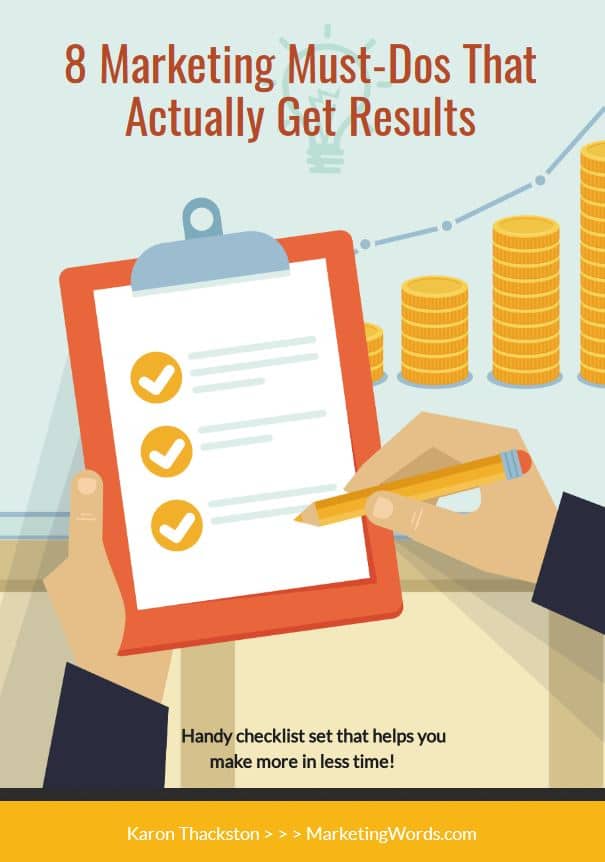 Ask me who I admire when it comes to online marketing and growing an online biz and Cindy Bidar will be near the top of a short list. A long-time friend and my former virtual assistant, Cindy has thoroughly impressed me with the level she has reached in her business and the manner in which she has done it.
Ask me who I admire when it comes to online marketing and growing an online biz and Cindy Bidar will be near the top of a short list. A long-time friend and my former virtual assistant, Cindy has thoroughly impressed me with the level she has reached in her business and the manner in which she has done it.
That’s why I asked her to share a bit of grey matter with us today. Pay attention as Cindy talks frankly about internet marketing and what it really takes to make it work.
—————————–
KARON: How hard is online marketing these days?
CINDY: Wow, that’s a loaded question to lead with!
I’m going to take a stand here, though, and say it’s not hard at all, and it’s getting easier all the time.
We have a ton of tools and resources that will help us find, attract, and sell to an audience. We have social media platforms which attract specific audiences. We have powerful keyword research apps that help us figure out exactly what those people need, and how they look for it online. We have the ability to reach a massive, highly targeted audience for a relatively small investment in ads — and that’s something that, in the past, was only available to companies with Super Bowl–sized budgets.
Of course no one is born knowing how to do all of those things. Luckily, the same internet that lets us reach our people also lets us learn how to use technology to get in front of them. There is literally nothing you cannot learn on the internet.
So the marketing part is easy. What’s hard is actually taking action. That’s where people get stuck.
 KARON: #Truth! Implementation is just as important as planning and learning. You can do all that other stuff, but if you never put it into action, what good has it done you? So, in your interactions, what do you believe most online business peeps find is the most frustrating?
KARON: #Truth! Implementation is just as important as planning and learning. You can do all that other stuff, but if you never put it into action, what good has it done you? So, in your interactions, what do you believe most online business peeps find is the most frustrating?
CINDY: In my sphere, which is beginning to intermediate marketers, the two big frustration points are not knowing where to begin, and not understanding how all the many, many pieces all fit together into one cohesive business.
Both of these groups have the same problem — too much input — which is the flip side of that “you can learn anything online” coin I just mentioned.
Because there’s so much information out there, and because so much of it seems to contradict other information, it’s easy to get overwhelmed. When you feel that way, it’s really difficult to move forward.
KARON: How do you respond to those people?
CINDY: I was coaching a new client recently and he asked a really great question: “As I get started, what is something you would advise me to avoid?”
I told him to focus just on the next step. Don’t worry about all that comes after that, just do the next thing. In his case, it was to get a landing page up, so he could start to build his email list.
What happens for a lot of people when they’re faced with that big project like starting a business, is that they leap into planning mode. They have their opt-in offer, but they don’t want to put it out there just yet, because they don’t have a good upsell for it. Or they don’t know what emails to put in the funnel yet. Or their product isn’t quite ready for sale yet.
What I’m saying is: You don’t have to have all of that figured out before you start. You can piece it together as you go. Don’t let the fact that you can’t see the whole path stop you from taking the next step, and we almost always know what that next step is if we stop to think about it.
KARON: I agree! I had to learn to do that very thing years ago. Excellent advice! Do you believe it takes a certain level of brilliance to grow an online / internet business these days?
CINDY: I don’t think you have to be brilliant at all. I mean, brilliance is great, of course. Steve Jobs, Bill Gates, Elon Musk, and plenty of other people take their brilliant ideas and turn them into hugely successful businesses.
But for every brilliant person, there are thousands of others who are incredibly successful in business as well, and not because they create things no one else ever thought of or build rocket ships to send to Mars. All those other people are successful just because they take action.
I have lots of friends in the online space who are wildly successful, and I wouldn’t call any of them brilliant. They’re all hard workers though. They set goals and do the tasks and finish the projects and consistently show up, day after day, week after week, even when it stops being fun or exciting.
So no, you don’t have to be brilliant. You have to be committed and consistent. That’s what drives success.
 KARON: You talk a lot about consistency. In fact, one of your Cindy-isms is “Consistency outperforms brilliance every time.” Can you go a little deeper into that?
KARON: You talk a lot about consistency. In fact, one of your Cindy-isms is “Consistency outperforms brilliance every time.” Can you go a little deeper into that?
CINDY: People sometimes ask me what the best tool or platform or strategy is for whatever they want to accomplish. My answer always starts with “The one you’re actually going to use.”
What doesn’t work is the distracted approach, where you spend a little bit of time on Instagram, and a little bit of money on Facebook ads, a little bit of effort with email, and a little bit of time doing keyword research for your blog.
Maybe you start posting every day on Instagram because you read an article about how one of your competitors used Instagram to sell 837 copies of her $2,000 course.
Then a couple of weeks later, you listen to an interview with another competitor who says she sold HER course through Facebook ads. Now all the hours you’re spending to get your Facebook ads running are taking away from your Instagram efforts.
When you jump from strategy to strategy like that, it’s easy to fool yourself into thinking that you’re looking for the one that works. But the truth is, they ALL work.
Instagram works. Plenty of millionaire marketers are building their businesses largely through Instagram. Facebook ads work. I personally know several 7-figure business owners whose monthly Facebook ads budget is close to six figures. No one spends that kind of money on ads that don’t work. Email works, too. It’s the primary method of communication for me, and for most of my business friends as well. In my business, email marketing accounts for about 40% of my total income.
But inconsistent efforts won’t produce good results no matter how brilliant the strategy is. Instead, I recommend focusing on one strategy until you master it.
For example, if you want to ramp up your email marketing game, then dive in. Study it. Put the systems in place to build a good workflow, and work it until it becomes second nature. Once it’s running smooth, and you’re taking consistent action, then it’s time to look at the next strategy you can add to the mix.
That means keeping two things in mind: What do you enjoy, and where are you likely to find your ideal client.
Download your…
Time-Tested, Proven Marketing Strategies
That Actually Work
A handy checklist set that helps you drive traffic, make more money & spend less time doing it.

I understand that I will also receive weekly articles & videos plus periodic discounts, product notices & more. I can unsubscribe at any time.
For me, that means I completely ignore Instagram. I know it’s the hottest thing out there, and if you follow people like Amy Porterfield and Jenna Kutcher, you’ll hear them talk all the time about the results they get on that platform.
However, I also know me, and that platform just isn’t fun for me. I don’t enjoy it. Not only that, but my audience is far more likely to be on Facebook than they are on Instagram, so it just doesn’t make a lot of sense for me to dig into Instagram. Maybe someday I will, but for right now, I can comfortably ignore that particular bright shiny object.
If you are in the market for a course, then Lynn Terry has some advice I’ve always found helpful. She recommends that every purchase should earn its keep before you invest in the next thing. In other words, if you haven’t yet earned enough from your last course to cover what you paid for it (and hopefully more), then before you go shopping for something else, dig back into that one. Put those strategies to work first, and put your blinders on to the rest.
KARON: Yes! Totally true. So, does it really boil down to how we spend our time? If time is money, does that mean being unproductive makes us lose money?
CINDY: I do believe that being unproductive costs money. Every day I work hard to be as productive as I can be. I also fail a lot — but that’s a story for a different blog post.
We have to be careful, though, that we don’t mistake “busy” for “productive.” They’re not the same thing at all. When I’m busy, I feel like I’m juggling a dozen things. The problem is, none of them actually get done.
But when I’m productive, projects get finished. I might spend fewer hours in my office, but I’m working much more effectively during that time. It’s all about choosing the right things to work on, and either deferring or delegating the rest.
KARON: You and I are a lot alike in that respect. But, one key difference is that you’re a super tech and I’m a technophobe! What’s the secret for people like me who need to master techy stuff in order to market our businesses?
CINDY: I am definitely not a super tech. If you knew how much time I spend Googling the answer, you’d be shocked!
The only difference between you and me (and anyone else who is a self-described technophobe) is that I am never afraid to try something. I’m confident enough to click all the buttons and explore all the menu options or even copy and paste some snippet of code that looks promising, all in an effort to get something to work the way I want it to work.
Years ago, on my first day of work at the last day job I ever had, my boss said something to me I’ve never forgotten.
I was sitting in front of this massive desktop computer — think old-school CRT monitor that probably weighed 30 pounds — and the software that ran the factory was all green text on a black background. We didn’t have a mouse or any modern graphic interface, it was strictly text input and lots of function keys and weird commands, so it wasn’t at all intuitive.
As he was showing me how to prepare a shipment to go on the truck, my boss said to me, “Just remember, you can’t screw it up so bad it can’t be fixed.”
His saying that gave me the confidence to do my job. It let me know that it was OK to try to find the answer myself without asking him about every little thing — and I’m sure that was his goal!
It’s even more true today than it was then. You really can’t screw anything up so badly it can’t be fixed. Even if you completely delete your website and all its data from your server, it can still be restored — provided, of course, that you have a good backup procedure in place.
There’s another key to this confidence shift, too, and that’s about who you know.
When my husband and I first launched our business, he was concerned about getting in over our heads. He wanted to know that my techy skills could solve any problem anyone ever had. Of course, that’s not the case for me or anyone else.
What I told him is that I don’t have to know everything. I just have to know the people who know.
I have a wide circle of friends I can call on for everything from WordPress design to Infusionsoft issues. I belong to a couple of membership sites that are filled with resources I can access on demand, as well, so that gives me another boost of confidence. Beyond that, the world is filled with experts, and we can reach out to them at any time thanks to Google.
All of that means there’s absolutely no reason to keep telling yourself that you’re a technophobe. You have the very same resources I have. 🙂
 KARON: Aren’t you sweet? It still makes me shiver! LOL How do YOU market your biz? How do you keep all the balls in the air?
KARON: Aren’t you sweet? It still makes me shiver! LOL How do YOU market your biz? How do you keep all the balls in the air?
CINDY: I try to be highly organized. I love my to-do lists (I use ToDoIst, if you’re interested), and I ruthlessly calendar everything, so not only do I know what needs to get done today, I know exactly when I’m going to do it.
I really do use all of the checklists and systems that I teach in Six-Figure Systems, too, and that alone saves me so much time and wasted effort. When you do the same things the same way every time — whether it’s posting to your blog or setting up a new funnel or scheduling your social media — you naturally get faster and more efficient at it.
Not only that, but when you take the time to track and measure your results, you find out pretty quickly what projects and tasks aren’t working for you, so you can drop those in favor of the things that help you grow.
I’m a huge fan (some would call me a bit obsessed) of tracking things like conversion rates and earnings per click and blog traffic. All of those things directly impact my income. When you understand what they are, where they come from, and how to change them, you not only become a much better marketer, but you have a lot more free time, too.
When you’re doing the right things, you don’t have to juggle.
KARON: Yes! That! ^
How does Cindy know all this stuff? Because she lives it every day. She also helps other internet marketers by providing monthly strategies along with guidance and training. Want to work with Cindy to implement more automated online marketing into your current plan? Believe it or not, it doesn’t cost hundreds of dollars a month.
 In fact, it’s less than $50 when you gain access to her premier 6-Figure Marketing program. And because you’re a Marketing Words peep, you can even deduct $10 per month from that with code MARKETINGWORDS.
In fact, it’s less than $50 when you gain access to her premier 6-Figure Marketing program. And because you’re a Marketing Words peep, you can even deduct $10 per month from that with code MARKETINGWORDS.
Have questions about internet / online marketing? Talk to me below!
Other Related Posts You’ll Love
Advanced Marketing Strategy: Use Repeatable Marketing Systems
Single Page Builder for WordPress: Easy One Page Scrolling Website Templates From Thrive Architect



